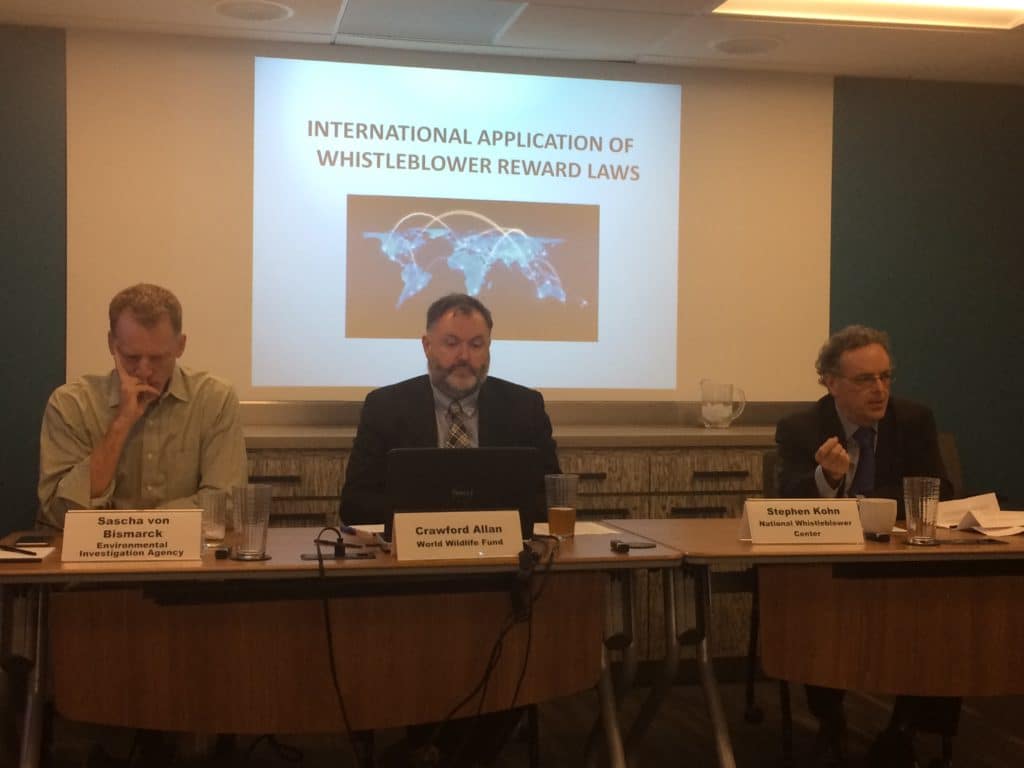On February 9th the Environmental Law Institute (ELI), in partnership with the National Whistleblower Center, hosted the first seminar in a two-part series on wildlife whistleblowing. “Harnessing the Power of Whistleblowers: Combating Wildlife Crime” focused on the vital role that whistleblowers play in the fight against global wildlife trafficking. Panelists included Stephen M. Kohn, Executive Director of The National Whistleblower Center; Crawford Allan, Senior Director of the World Wildlife Fund (WWF); and Alexander (Sascha) Von Bismark Executive Director of the Environmental Investigation Agency (EIA).
International Application of U.S. Whistleblower Reward Laws
During his presentation, Kohn (NWC) emphasized that tips from whistleblowers are “in every region of the world… the absolute largest source of detection [of crime].” Kohn further explained how existing U.S. reward laws could be applied to whistleblowers reporting wildlife crime, including the Foreign Corrupt Practices Act (prohibiting bribery of foreign government officials); and the False Claims Act (criminalizing customs violations), in addition to wildlife whistleblower reward laws like the Lacey and Endangered Species Acts. Unfortunately, both the wildlife reward provisions and the application of these other U.S. reward laws have not yet been effectively used to combat wildlife crime.
The Illegal Wildlife Trade is an Increasing Threat
Allan (WWF) reinforced the imminent threat posed by wildlife trafficking, reporting that poachers slaughter 20,000 African elephants a year, and there has been a 9,300% increase in rhino poaching in South Africa from 2007-2014.
Allan reported that the trafficking of endangered species, often by organized criminal networks, relies heavily on bribes to transport huge quantities of skins, bones and live animals across country borders.
This is where whistleblowing can present great opportunities for exposing the corruption traffickers rely on, and help authorities trace the trail of corruption back to the masterminds orchestrating the criminal network. Individuals in the shipping and transportation industry, park rangers who guard and protect endangered species, and others involved in the trafficking flow are in a prime position to expose such bribery, and report their insider knowledge.
We Need to Empower Whistleblowers
Von Bismark (EIA), highlighted the importance of both governments and NGOs in sending a very clear signal to the public that they support whistleblowers. Whistleblowers take extraordinary risks in reporting illegal activity, often risking not only their professional careers, but their lives. There needs to be some type of compensation and guarantee of safety if we are to fully utilize the power of whistleblowing.
Whistleblowers must be assured that the risks they are taking are worth the potential impact their reporting can have on global corruption, and we need to ensure that the legal mechanisms are there to incentivize informants.
The seminar panel gave a final word of advice for any potential whistleblowers: before reporting any potential violations—know your rights. “How you word your concern, and to whom you report it, can be the difference between winning a case or not. Seek legal advice before going to the authorities.”
The second seminar, Representing Wildlife Whistleblowers: Technical Skills for Lawyers will be on March 28, 12:00-1:30PM (EST).
Learn about the National Whistleblower Center’s work to combat wildlife trafficking at www.whistleblowers.org/wildlife.
More Information:
